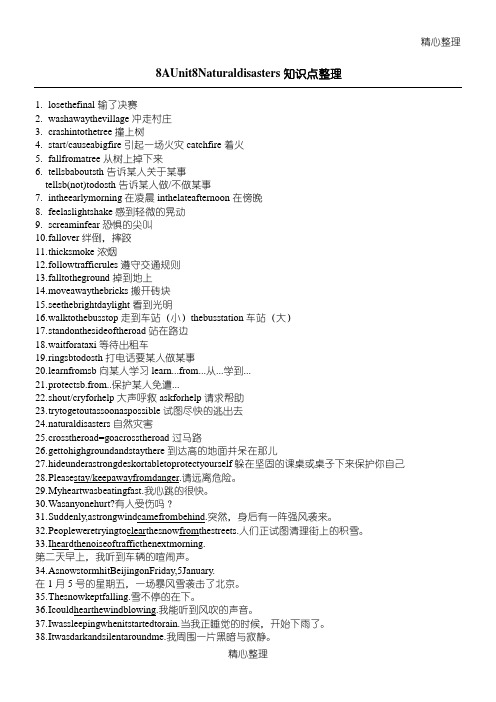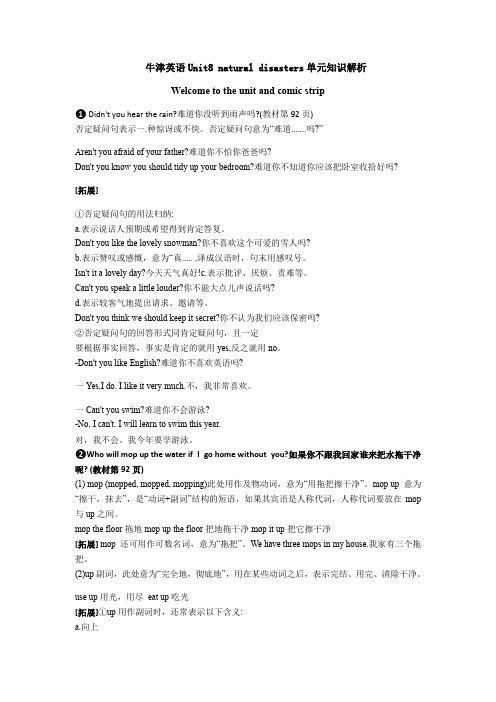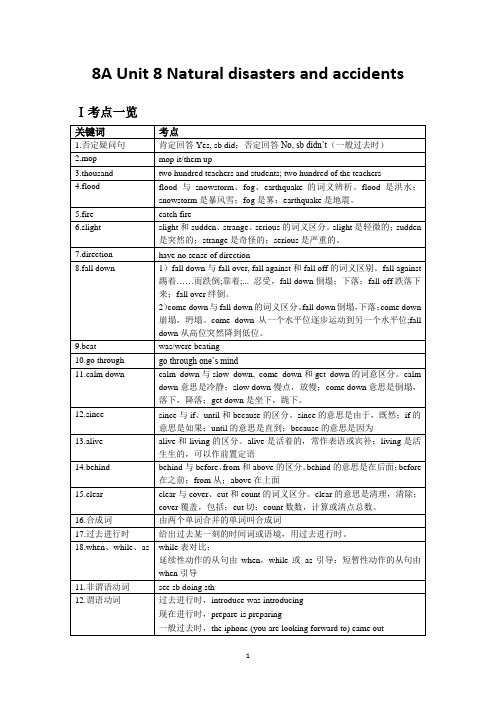新牛津英语8A-Unit-8词组、句型、语法
牛津英语8A unit8知识点整理

精心整理8AUnit8Naturaldisasters知识点整理1.losethefinal输了决赛2.washawaythevillage冲走村庄3.crashintothetree撞上树4.start/causeabigfire引起一场火灾catchfire着火5.fallfromatree从树上掉下来6.tellsbaboutsth告诉某人关于某事tellsb(not)todosth告诉某人做/不做某事7.intheearlymorning在凌晨inthelateafternoon在傍晚8.feelaslightshake感到轻微的晃动9.screaminfear恐惧的尖叫10.f allover绊倒,摔跤11.t hicksmoke浓烟12.f ollowtrafficrules遵守交通规则13.f alltotheground掉到地上14.m oveawaythebricks搬开砖块15.s eethebrightdaylight看到光明16.w alktothebusstop走到车站(小)thebusstation17.s tandonthesideoftheroad站在路边18.w aitforataxi等待出租车19.r20.l21.p22.s23.t24.n25.c26.g27.h28.P29.M30.W asanyonehurt?有人受伤吗?31.S uddenly,astrongwindcamefrombehind.突然,身后有一阵强风袭来。
32.P eopleweretryingtoclearthesnowfromthestreets.人们正试图清理街上的积雪。
33.I heardthenoiseoftrafficthenextmorning.第二天早上,我听到车辆的喧闹声。
34.A snowstormhitBeijingonFriday,5January.在1月5号的星期五,一场暴风雪袭击了北京。
牛津英语8A Unit8 natural disasters 单元知识解析

牛津英语Unit8 natural disasters单元知识解析Welcome to the unit and comic strip❶ Didn't you hear the rain?难道你没听到雨声吗?(教材第92页)否定疑问句表示一.种惊讶或不快。
否定疑问句意为“难道.......吗?”Aren't you afraid of your father?难道你不怕你爸爸吗?Don't you know you should tidy up your bedroom?难道你不知道你应该把卧室收拾好吗?[拓展]①否定疑问句的用法归纳:a.表示说话人预期或希望得到肯定答复。
Don't you like the lovely snowman?你不喜欢这个可爱的雪人吗?b.表示赞叹或感慨,意为“真..... ,译成汉语时,句末用感叹号。
Isn't it a lovely day?今天天气真好!c.表示批评、厌烦、责难等。
Can't you speak a little louder?你不能大点儿声说话吗?d.表示较客气地提出请求、邀请等。
Don't you think we should keep it secret?你不认为我们应该保密吗?②否定疑问句的回答形式同肯定疑问句,且一定要根据事实回答,事实是肯定的就用yes,反之就用no。
-Don't you like English?难道你不喜欢英语吗?一Yes,I do. I like it very much.不,我非常喜欢。
一Can't you swim?难道你不会游泳?-No, I can't. I will learn to swim this year.对,我不会。
我今年要学游泳。
❷Who will mop up the water if I go home without you?如果你不跟我回家谁来把水拖干净呢? (教材第92页)(1) mop (mopped, mopped, mopping)此处用作及物动词,意为“用拖把擦干净”。
新版牛津8A Unit1-8知识点与语法

M3U1 Friends内容要点:形容词比较级和最高级Comparative and superlative adjectives基本要求:掌握新单词与重要短语熟识形容词比较级与最高级重难点:形容词比较级与最高级变形规则与用法知识点解读:1. something to drink 一点喝的东西Can I have something to drink? 我能来点喝的吗?2. what about sth./ doing sth.(1) 询问情况或打听消息I’d like a cup of tea, what about you? 我想来杯茶,你呢?(2) 向对方提出建议或请求。
相当于句型Would you like...What about playing football now? = Would you like playing football now?(3) 寒暄时用作承接上下文的转折语。
I’m a student, what about you? 我是一名学生。
你呢?(4) 询问天气或身体状况。
What about the weather today? 今天天气怎么样?What about your mother? You can’t keep her too tired.你母亲身体好吗?你不能让她太累(5) 征求对方意见或看法。
What about this bike? 这辆自行车怎么样?3. have some more food 再来点食物4. honest(1) adj. 诚实的,正直的I know she's honest and reliable. 我知道她是诚实可靠的。
(2) 坦诚的I was honest about what I was doing. 我对我所做的一切毫不隐瞒。
【扩充】:honest to God (表示强调) 千真万确e.g. I wish we weren't doing this, honest to God, I really do.我希望我们没在做这件事,真的,我确实这么想。
新版牛津英语8A重点单词句型及短语.docx

新版牛津英语8A重点单词句型及短语.docx8A Unit One重点短1. something to drink一些喝的西2. one of my best friends我最好的朋友之一3. grow up大4. have some more food再吃些食物5. keep a secret保密6. have a good sense of humour 很有幽默感7. tell funny jokes有趣的笑8. walk past our desks我的桌9. social worker社会工作者10. make sb. look smart使某人看上去明11. say a bad word about sb. 某人的坏12. feel bored or unhappy感到无聊或不高13. travel around the world 周游世界14. help me with my homework帮助我做作15. make ab. happy使某人高16. wear small round glasses 戴着小而的眼17. have problems有18. be willing to do sth愿意做某事19. make friends交朋友20. share things with sb.和某人分享西21. our future plans我的未来划22. have long straight hair有着的直23. have a good voice有副好嗓子24. listen to people carefully 仔地听人25. care about关心26. knock ? onto ?把??撞到?? 上27. any time任何候28. give a seat to someone in need把座位有需要的人29. both my neighbour and my best friend既是我的居,也是我最好的朋友8A Unit One重点句型1. My book is more interesting than his.2. Can I have something to drink?3. Can I have some more food?4. She is willing to share things with her friends.5. You can trust them because they never tell lies.6. She always has a smile on her face andlooks happy. 7. He tells funny jokes and always makes me laugh.8. She is also helpful andready to help people any time. 9. I would like to be a social worker when I grow up.10. When something worries me, I can always go to her.11. She smiles often and never says a bad word about anyone.12. Who would you like to choose as your best friend?13. I can tell her anything because she can keep a secret.14. When he walks past our desks, he often knocks ourbooks and pens onto the floor.8A Unit Two重点短1. fewer advertisements 更少的广告2. jump high跳得高3. in Year 8在八年4. do sports together一起做运5. during the week在周内6. play baseball打棒球7. every time每次8. any other student任何其他学生9. have different classes 有不同的10. a mixed school一个男女混合学校11. work the hardest工作 /学最努力12. discuss sth with sb.和某人某事13. a Reading Week一个周14. offer me help我提供帮助15. at most至多16. spend time on/doing sth.花做某事17. look through18. have fewer weeks off有更少星期的假期19. at first起初20. near the end of?在?? 快要束21. in class在堂上22. bring in books and magazines 来和志23. keep (on) doing sth. 重复做某事24. at lunchtime在午餐25. go on a school trip行学校旅行26. have lots of time for after-school activities 有多行体育活27. read an article by a boy from the USA 了一个美国男孩的文章8A Unit Two重点句型1. Millie has the least juice.2. Daniel has the fewest tomatoes.3. L earning foreign la nguages is fun.4. Because they are cleverer than people.5. Among all my subjects, I like French best.6. I often read more books than my classmates.7. I read an article by a boy from the USA.8. Millie has more tomatoes than Daniel.9. I also keep writing in English about my daily life.10. On Friday afternoon, our school ends earlier than usual.11. Time seems to go faster when we are reading interesting books.12. He often listens carefully to my problems and offers me help.13. I have less free time than John, but Nancy has more free time than John. 14. What ’ s school like? It’ s like watching,but TV there are fewer advertisements. 15. Millie writers carefully. She writers more quickly than the other students in my class. Millie writers the most quickly of us all.8A Unit Three重点短1. need to exercise需要2. go past走3. keep fit保持健康4. can ’ t wait迫不及待5. come on来吧,赶快6. cheer for呼7. enjoy oneself玩得开心8. get on上9. take a boat trip乘船旅行10. place of interest名11. have a great time玩得开心12. invite sb. to do sth邀某人做某事13. a lot of traffic交通繁忙14. take care保重15. arrive in/at到达16. get off下17. take place生18. in front of sb.在某人面前19. all over the world全世界20. be made of?由??制成21. home page主22. not believe one’ s不eyes相信自己的眼睛23. hurt oneself使自己受24. take the underground乘地25. keep secrets to themselves 保守他自己的秘密8A Unit Three 重点句型1.Go and see for yourselves.2. We hope you can join us.3.Mr Wu is as happy as the two girls.4. Don ’ t forget to bring your friends!5.The match takes place on Sunday.6. With your support, we will win!7.The cost of the trip is$10 per student8. Luckily, some climbers helped Simon.9.My ticket is useless now, but I'll keep it!10. It is in the final of the basketball competition.11. Simon is trying to pull himself up the rocks.12. It took us about two hours to get there bybus. 13. Soon the whole world was there in front of us. 14.We are planning a day out on Saturday, 16 October.15. The Eiffel Tower is not as tall as the real one in France.16. MrWu invited us to join their school trip to the World Park.17. There was a lot of traffic on the wayand the journey was a bit boring.18. There are models of more than a hundred places of interestfrom all ov er the world.8A Unit Four重点短1. had better最好2. clear instruction清楚的明3. stand for代表4. put up a picture一幅画5. instead of代替6. attend lessons上7. a pair of scissors一把剪刀8. colour the roses red将玫瑰着成色9. be crazy about?? 着迷10. make some paper roses制作玫瑰11. put in安装12. advise sb. to do sth建某人做某事13. make a mistake犯14. not only? but (also) 不?? 而且??15. kept doing sth.反复做某事16. leave it in the air将它留在空气中17. for example例如18. paint it blue把它涂成色19. next door隔壁20. cut? into?把??切成??21. tidy up整理好22. fill? with ?用??填充??23. keep it secret.保密24. take a course in?学?? 方面的程25. in the end最后26. spell the words wrong拼27. go wrong出28. mix them together将它混在一起29. have a power cut停30. have fun doing sth做某事很开心8A Unit Four重点句型1. Don ’ t paint the cat.2. Here are clear instructions.3. You ’ d better get some tools.4. We had fun working together.5. Your watch is broken.6. You had better not be late for school.7. I ’ m certain thatcanI fix it myself.8. I kept spelling the words wrong.9. You should not put so many books on the shelf.10. Cut some of the larger fruit into small pieces. 11. I made some mistakes when I wrote the sent ence“ Happy Birthday, Mum” .12.Now the living room has not only blue walls but also a blue ceiling and floor,13.They couldn't stay there because one end of the shelf was much higher than the other!14.When you do DIY, you make. repair or decorate things yourself instead of paying someone todo it.8A Unit Five 重点短1. cut down砍倒2. face serious problems面重的3. get lost迷路4. smell things far away到的西5. live alone独自居住6. work as a team作一个而工作7. in the wild在野外8. have/take pity on同情9. in fact上10. look s o cute看上去如此可11. be born出生12. not ? any more不再??13. look like看上去像14. look after照15. as a result因此16. lose living areas失生存的地区17. in danger于危中18. at four months old在 4 个月的候19. take action采取行20. right away立刻、上21. at birth在出生22. build more panda reserves建立更多的熊猫保区23. in the beginning一开始24. make laws to protect pandas 布法律保熊猫8A Unit Five 重点句型1. I may die without them.2. We should take action right away.3. So could you please not eat them?4. We shouldn ’ t buy fur coats any more.5. They ’ re the kings of the animal . Sadly, giant pandas face serious problems in the wild. 7. I think everybody should act to protect wild animals. 8. When Xi Wang was born, she weighed just 100 grams. 9. When she was sixmonths old, she began to eat bamboo. 10. When she was 20 m onths old, she learnt to look after herself. 11. As a result, pandas may not have a place to live or food to eat.8A Unit Six重点短1. at the market在市上2. take sth. with sb.某人随身携某物3. all year round一年到4. a pair of binoculars一副望5. in order to以便,的是6. make sb. do sth.使某人做某事7. lead to致8. provide sth. (for sb)(某人)提供某物9. less and less越来越少10. the members of的成11. keep fishing一直12. invite sb. to do sth.邀某人做某事13. write down写下来14. call sb. on?按照?? 某人15. as a result果16. changes in their numbers数目方面的化17. what else有什么18. take photos of the birds儿拍照19. date of birth出生日期20. make laws to prevent制?定法律来阻止??21. have more space有更多的空22. email me at?我件至??23. in North-east China在中国北24. make beautiful sounds 出漂亮的声音25. take part in activities参加活26. enjoy the natural world欣自然世界27. at bird shows在展上28. spend the winter冬29. understand the importance of the wetlands理解湿地的重要性8A Unit Six重点句型1. We are now inviting them to help us.2. I would like to join the Birdwatching Society.3. She saw a baby panda drink her mother’4. Wesmilkask. people not to catch birds for any reason.5. It is one of the world’most impor tant wetlands.6. The area provides food and cover for a lot of wildlife.7. We need more people to count and describ e the birds.8. The reserve covers an area of over 4,530 square ki lometers.9. Every year, a lot of tourists go to Zhalong to watch the birds.10. Usually it takes hours to watch the birds. You may get thirsty.11. Take a notebook with you in order to write down what you see.12. We hope this will help people understand the importance of the wetlands.13. I will be very happy if I can become a member of the Biirdwathcing Society.14. I am very interested in learning about different kindsof plants, birds and animals. 15. Some people want to make the wetlands smaller in order to have more space for farms and buildings.8A Unit Seven重点短1. be full of充??2. t he best time to do sth. 做某事的最好3. play among flowers在花中玩4. the lowest temperature最低温度5. fly far away往方6. be covered in deep white snow被厚厚的雪覆盖着7. turn brown黄8. stay above zero在零度以上9. rhyme with与??押韵10. drop below?下降到?? 以下11. harvest crops收庄稼12. make people sleepy 使人感到瞌睡13. the rest of其余14. cover? with?用??覆盖??15. have a high fever高16. turn more cloudy得更加云密布17. feel cool感到凉爽18. fall into piles upon the ground落地成堆19. snowball fights雪球仗20. the sudden heavy rain突如其来的大雨21. cough a lot咳嗽很害22. during this season 在个季里23. from morning till night从早到晚24. throw snowballs at each other互扔雪球25. forget to grow忘了生26. use carrots for their noses 用胡卜当它的鼻子27. a bit有一点28. on a hot summer afternoon 在一个炎的夏天下午8A Unit Seven重点句型1. The clouds became dark,2. This is Aunt Jane speaking.3. What a perfect time to fly a kite!4. It ’ s the best time to play football outside.5. The days of spring are windy a nd bright.6. It is exciting to have big snowball fights.7. How do people feel on a hot summer afternoon?8.I bet you l look’l cool and feel cool with nothing on! 9. The temperature is usually below zero and it is often snowy. 10. We throw snowballs at each other, screaming and laughing.8A Unit Eight重点短1. wake up醒来2. mop up把?? 拖干3. crash into撞上??4. wash away冲走5. catch fire着火6. fall from从?? 上跌落下来7. come down坍塌8. run out of从?? 中跑出9. not ? at all一点也不10. a moment of fear片刻的恐惧11. calm down定下来12. shout for help呼救13. move away搬走.14. feel a slight shake感到微震15. at last最后16. through the dark通黑暗17. break down抛18. as ? as possible尽可能??19. because of因20. fi nd one ’ s way out 找到出路21. in fear害怕地22. follow traffic rules遵守交通23. keep falling不停地落下24. come from behind来自后面25. nearly fall over几乎跌倒26. on the side of the road 在路27. in all directions四面八方28. protect oneself from保?自己免遭??29. hear shouts from excited people听到激的人群的叫喊声8A Unit Eight重点句型1. I was (not) sleeping at 10 . last night.2. I was sleeping when the earthquake started.3. I felt nervous and my heart was beating fast4. Who will mop up the water if I go home without you?5. Luckily, there was just enough space for me to move.6. There was a heavy storm with thunder and lightning.7. Lightning hit a classroom building and it caught fire.8. When/While/As Millie was watchin g TV, Andy came into the room.9. As I was trying to find my way out, I suddenly heard some noise above me.10. People were running in all directions while pieces of glass and bricks were falling down.11. A moment of fear went through my mind, but I told myself to calm down since I was still alive.12. Outside, people were running in all directions while pieces of glass and bricks were falling down.。
新牛津英语8A-Unit-8词组、句型、语法

8A Unit 8词组、句型复习提纲二、重点句子及句型:1.My house is all wet。
我的房子都潮湿了.2.I was sleeping when it started to rain.开始下雨时我正在睡觉.3.Didn’t you hear the rain?难道你没听到雨声吗?4.There was water everywhere.到处都是水。
5.Who will mop up the water if I go home without you?谁将把水拖干如果没有你我回家?6. A young boy fall from a tree and hurts his legs。
小男孩从树上掉下并伤了腿。
7.Lightning starts a big fire in the classroom building。
闪电击使教学楼着火了。
8.Lightning hit a classroom building and it caught fire.闪电击中教学楼并着火了.9.People were running in all directions while pieces of glass and bricks were falling down .当玻璃碎片和砖块落下来的时候,人们朝四面八方跑去。
10.I felt nervous and my heart was beating fast。
我感到紧张并且心跳很快.11. A moment of fear went through my mind,but I told myself to calm down since I wasstill alive.片刻的恐惧掠过我的大脑,但我告诉自己冷静下来因为我还活着。
12.I started to pull myself slowly through the dark。
我开始在黑暗中慢慢地向前移动身体.13.I heard shouts from excited people我听到兴奋的人们发出的叫喊声。
牛津译林版八年级英语8AUnit8Naturaldisasters知识点归纳总结

8A Unit8 Natural disasters一.词汇拓展1.shake v.→shaking (n.) 摇动2.direct v. →direction(n.) 方向3.live v. →alive (adj.) 活着的4.safe adj. →safety(n.) 安全5.fear (n.) →fearful(adj.)可怕的、担心的二.重点短语1. wash away 冲走wash 代词away2. be all wet 全湿了3. start to rain 开始下雨4. wake up 醒来wake代词up wake up+名词5. mop up the water 把水拖干净6. crash into a tree 撞在树上7. start big fire 引起大火8. fall from the tree 从树上掉下来9. a heavy storm with thunder and lightening 伴有雷电的大暴雨10. catch fire 着火11.in the early morning 在清晨12.feel a slight shake 感觉到轻微的晃动13.hear a loud noise like thunder 听到像雷声的噪音14. start to shake 开始摇晃shake hands with sb.15.scream in fear 恐惧地尖叫16. run out of the building 跑出楼房17.try my best to run out 尽我所能的跑出18.begin to calm down 开始平静下来19.say to oneself 自言自语20. calm down 平静下来21. silent silence silently 安静寂静的22. not at all 一点也不23 find one’s way out 找到出路24. hear about the fire 听说火灾hear of 听说hear from收到...的来信25. Was anyone hurt? 有没有受伤?hurt v.adj.26. fear v. fearful fearless 害怕A moment of fear went through my mind. 一丝恐惧掠过我的脑海。
Unit8知识点和考点2022-2023学年牛津译林版八年级英语上册

4.Flood washes away villages.
(1)flood的基本含义做名词,意思是洪水。
(2)flood的核心考点考察flood与snowstorm、fog和earthquake的词义辨析。flood是洪水;snowstorm是暴风雪;fog是雾;earthquake是地震。
4. A terrible _____ hit the village. It washed away lots of houses.
11.calm down
calm down与slow down, come down和get down的词意区分。calm down意思是冷静;slow down慢点,放慢;come down意思是倒塌,落下,降落;get down是坐下,跪下。
12.since
since与if、until和because的区分。since的意思是由于,既然;if的意思是如果;until的意思是直到;because的意思是因为
3.There were _______ teachers and students sitting at our school’s playground to watch the performance of the new year’s celebration.
A. Two thousand of B. Two thousand C. Thousand of D. Two thousands of
7.direction
have no sense of direction
8.fall down
1)fall down与fall over, fall against和fall off的词义区别。fall against踢着……而跌倒;靠着;...忍受,fall down倒塌;下落;fall off跌落下来;fall over绊倒。
牛津英语 8A unit8 Grammar课件ppt

4. (hide behind the tree/ when/ a snowball hit him) Peter_w__a_s_h_i_d_i_n_g_b_e_h_i_n_d__th_e__tr_e_e_w__h_e_n__ _a_s_n_o_w_b_a_l_l_h_i_t_h_i_m_.__________________ 5. (run towards Millie/ while/ she/ take some photos) Andy_r_a_n__to__w_a_r_d_s_M__i_ll_ie__w_h_i_le__s_h_e_____ _w_a_s_t_a_k_i_n_g_s_o_m__e_p_h_o_t_o_s_. _____________
We use “were+ -ing” with the pronouns (代词)
___w__e_, _y__o_u__ andt_h_e__y__.
2. 过去进行时的句式 (1)基本结构:was/were + verb-ing
I was doing some shopping. People were running wildly. (2)否定式:was/were not + verb-ing was not = wasn’t were not = weren’t I was not running. People were not running wildly.
The Past Continuous Tense (过去进行时)
基本结构:
+ was / wasn’t
were / weren’t
Ving
We use “was+ -ing” with the pronouns(代词)
- 1、下载文档前请自行甄别文档内容的完整性,平台不提供额外的编辑、内容补充、找答案等附加服务。
- 2、"仅部分预览"的文档,不可在线预览部分如存在完整性等问题,可反馈申请退款(可完整预览的文档不适用该条件!)。
- 3、如文档侵犯您的权益,请联系客服反馈,我们会尽快为您处理(人工客服工作时间:9:00-18:30)。
8A Unit 8词组、句型复习提纲
二、重点句子及句型:
1.My house is all wet.
我的房子都潮湿了。
2.I was sleeping when it started to rain.
开始下雨时我正在睡觉。
3.Didn’t you hear the rain?
难道你没听到雨声吗?
4.There was water everywhere.
到处都是水。
5.Who will mop up the water if I go home without you?
谁将把水拖干如果没有你我回家?
6. A young boy fall from a tree and hurts his legs.
小男孩从树上掉下并伤了腿。
7.Lightning starts a big fire in the classroom building.
闪电击使教学楼着火了。
8.Lightning hit a classroom building and it caught fire.
闪电击中教学楼并着火了。
9.People were running in all directions while pieces of glass and bricks were falling down .
当玻璃碎片和砖块落下来的时候,人们朝四面八方跑去。
10.I felt nervous and my heart was beating fast.
我感到紧张并且心跳很快。
11. A moment of fear went through my mind,but I told myself to calm down since I was
still alive.
片刻的恐惧掠过我的大脑,但我告诉自己冷静下来因为我还活着。
12.I started to pull myself slowly through the dark.
我开始在黑暗中慢慢地向前移动身体。
13.I heard shouts from excited people
我听到兴奋的人们发出的叫喊声。
14.The earthquake hit Taiwai in 1999.
1999年台湾发生了地震。
15.What a terrible snowstorm !
多么可怕的暴风雪!
16.Try to get out as soon as possible
尽快逃出去。
17.Cover your mouth and nose with a wet towel to protect yourself from thick smoke.
用一个湿毛巾捂住嘴巴和鼻子以防浓烟。
18.Stay low to the ground.
身体下低贴近地面。
19.Never go back into the building on fire.
不要回到(进入)着火的大楼。
20.Don’t walk through the flood water.
不要穿过洪水。
21.Hide under a strong desk to protect yourself.
藏在结实的桌子底下以保护自己。
22.Look left, right and then left when you cross the road.
过马路时,先左看,右看,再左看。
23.Don’t walk or ride your bicycle on railways.
不要在铁路上行走或骑车。
24.We learnt a lot about keeping ourselves safe from fires, flood, earthquake and traffic
accidents.
我们学到了许多关于保持自己安全远离火灾、洪水、地震和交通事故的东西。
25.Do you know what to do first when we burn ourselves?
当我们烧伤自己时,你知道我们先做什么?
26.You should keep your hand in cold water for about ten minutes.
把手放入冷水达10分钟。
27. A snowstorm hit Beijing.
一场暴风雪袭击了北京。
28.Suddenly, a strong wind came from behind.
突然,一阵大风从后面刮来。
三、语法
1.过去进行时
过去进行时表示过去某一时刻或者某段时间正在进行或发生的动作,常和表过去的时间状语连用。
如:at that time/moment, (at) this time yesterday (last night/Sunday/week...), at+点钟+yesterday(last night/Sunday.).
过去进行时的构成:
肯定形式:主语+was/were+v.-ing。
否定形式:主语+was not(wasn't)/were not(weren't)+v.-ing。
疑问形式:Was/Were+主语+v.-ing。
如:
I was doing my homework at this time yesterday.
昨天的这个时候我正在做家庭作业。
They were waiting for you yesterday.
他们昨天一直在等你。
2.when,as和while的用法区别
(1)while只表示一段时间,while引导的时间状语从句中的动词必须是延续性动词,且主句的动作在从句动作的发生过程中发生或主从句两个动作同时发生。
如:
He was talking to me while he was watching the TV. 他一边和我说话,一边看电视。
(2) when既可以表示具体的时间点,也可以表示一段时间,它所引导的从句的动作可以发生在主语动作之前,也可以是发生在后。
当从句中都是延续性动作时,when与while可替换。
如:
When I came into the room, I found him lying there asleep.
当我走进房间时,我发现他正躺在那儿睡觉。
Mary was having dinner when I saw her.
当我看见玛丽的时候,她正在吃晚饭。
(3) as多用于平行结构,表示两个动作同时发生,一个主语同时进行两个动作,一种状态随另一种状态的变化而变化。
从句中多用表示动作的动词,而不用be动词或表示感觉、理解、知道这类动词。
如:
As he stood there, he saw two men enter the bar.
当他站在那儿时,他看见两个人走进了酒吧。
She dropped the glass as she stood up.
当她站起来的时候,她碰落了玻璃杯。
The students took notes as they listened.
学生们一边听讲一边记笔记。
(4)表示主句的动作发生在从句的较长动作过程中,when,while,as均可使用。
从句中为be 动词时,多用when和while。
谈论两个同时进行的长动作可用while,谈论两个平行动作或两种状态变化多用as。
